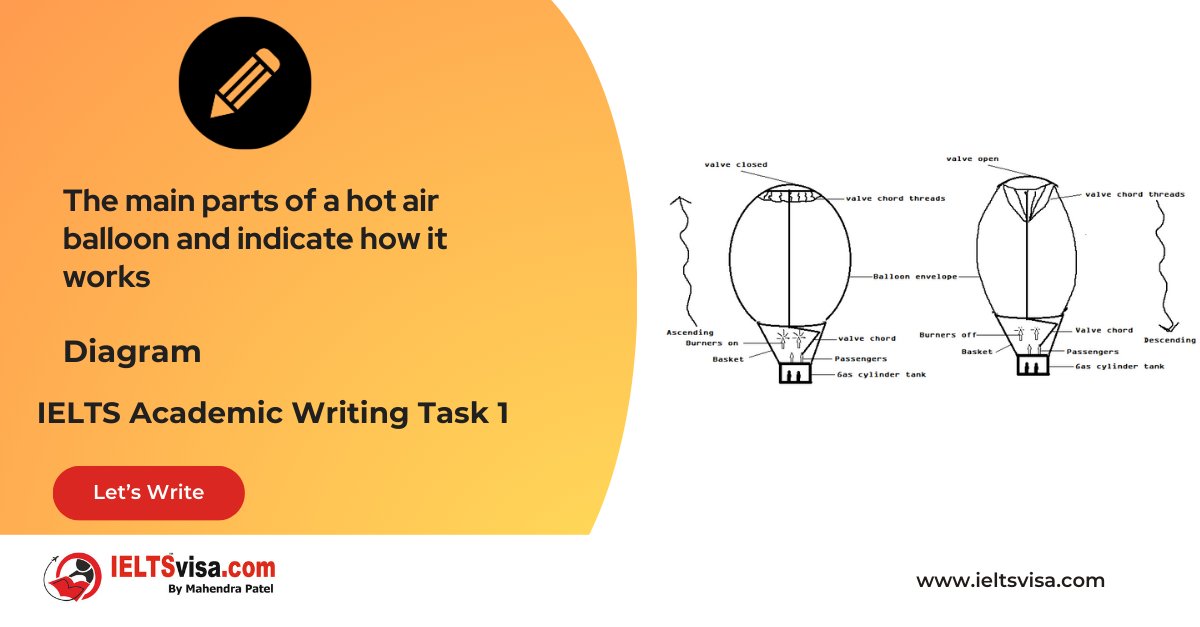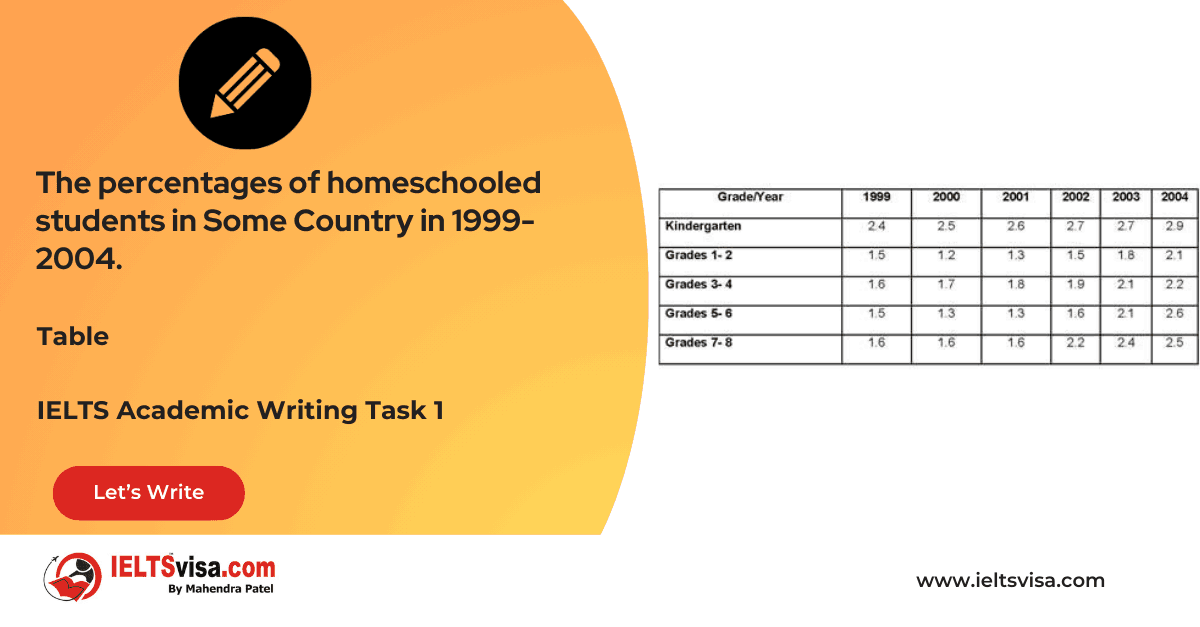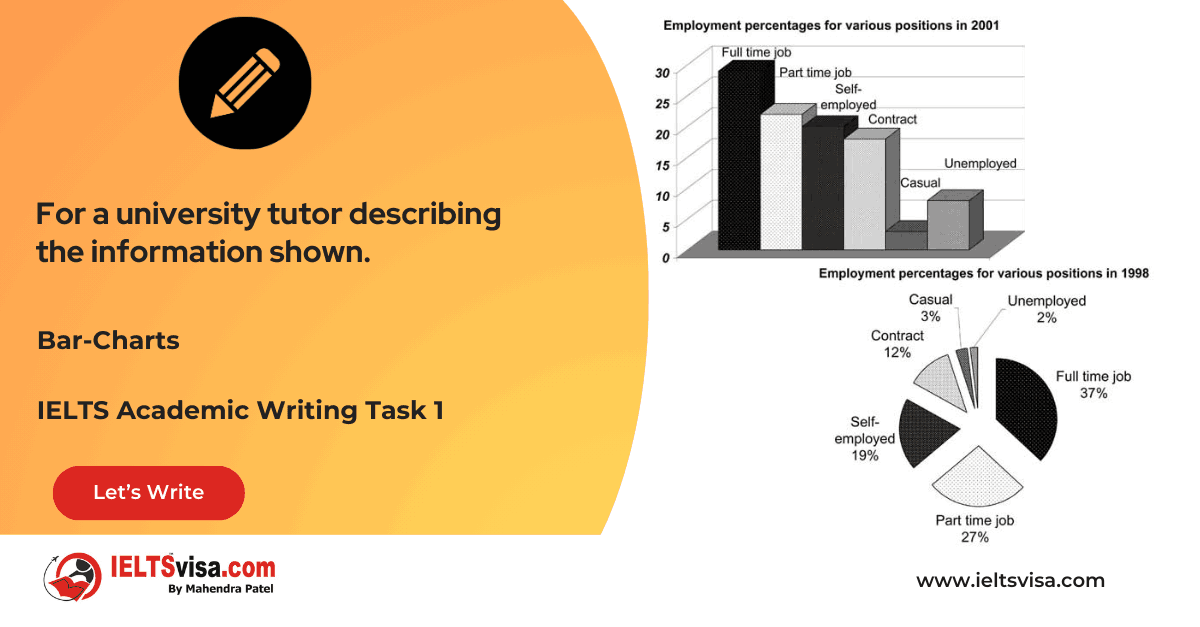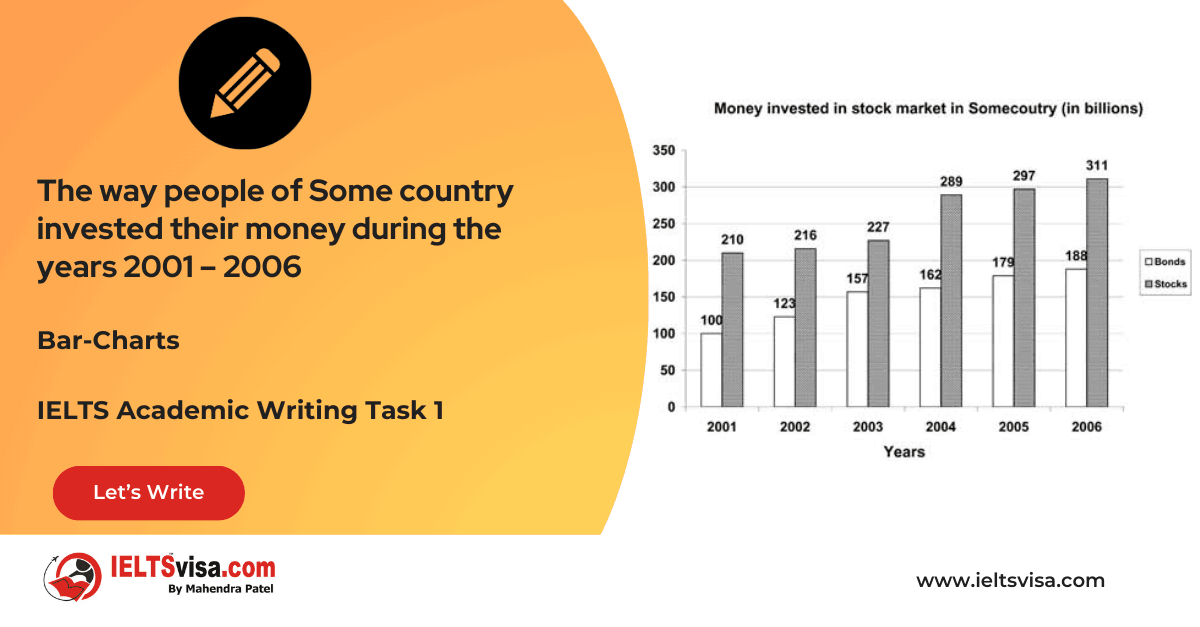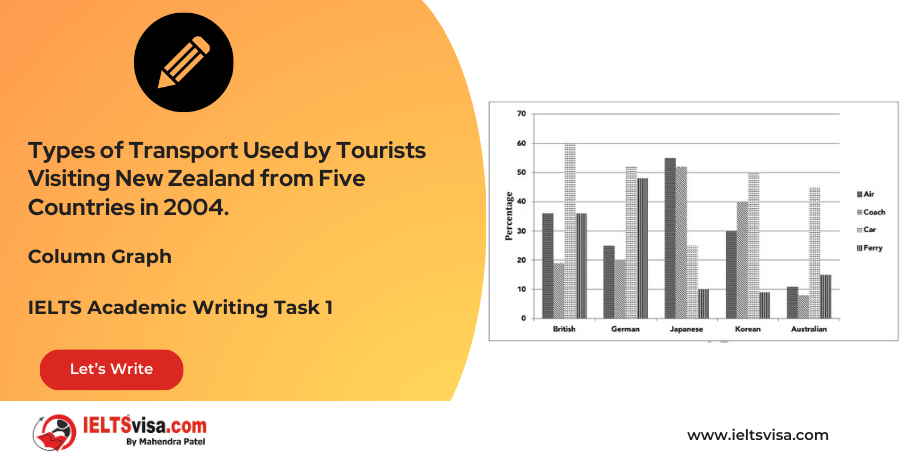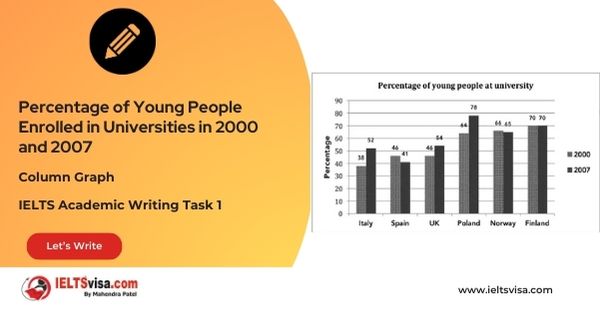The global sales (in billions of dollars) of different types of digital games between 2000 and 2006
IELTS Academic Writing Task 1 - Bar Graph
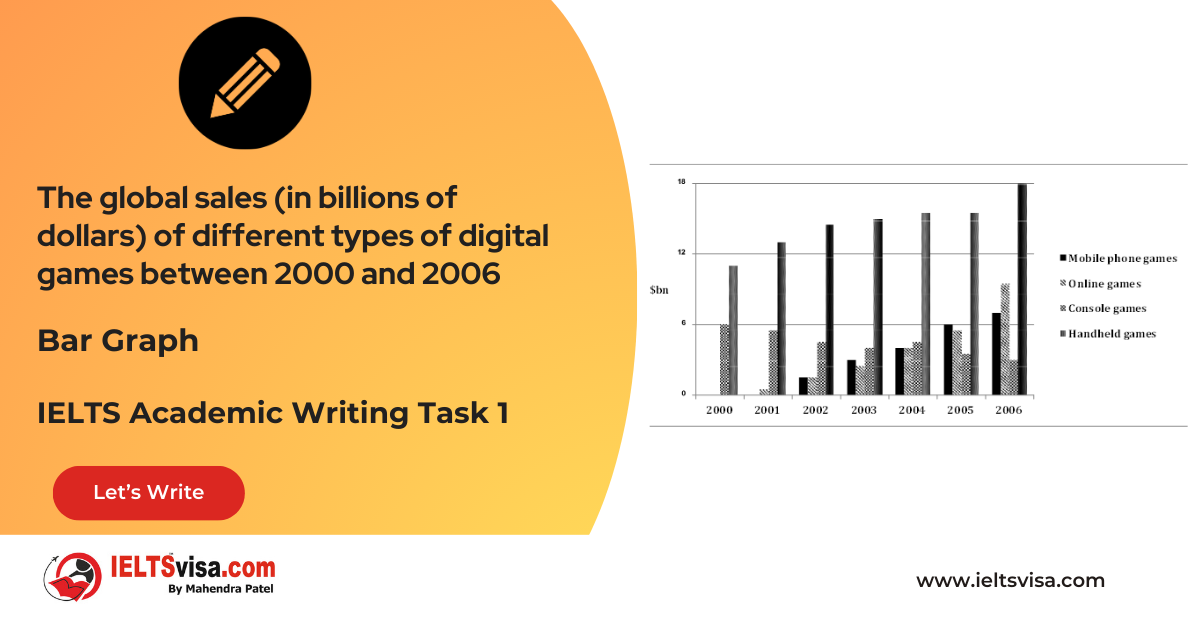
IELTS Writing Task 1 Question
The bar graph shows the global sales (in billions of dollars) of different types of digital games between 2000 and 2006. Summarise the information by selecting and reporting the main features, and make comparisons where relevant.
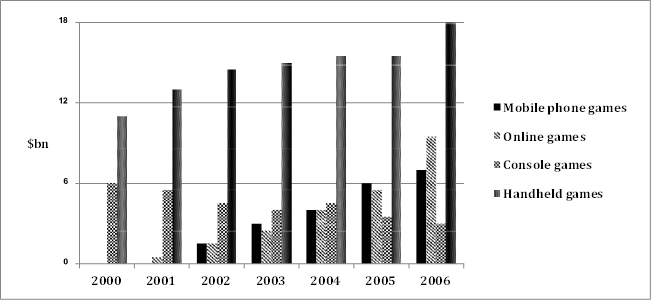
Common Questions for the Bar Graph
1. Graph Type: Bar Chart
2. Title: Global Sales of Different Types of Digital Games (2000–2006)
3. What are the units of measurement?: Sales in billions of dollars
4. Who: Types of digital games (mobile, online, console, hand-held)
5. When: 2000 to 2006
6. Where: Global
7. Topic: Trends in global sales of digital games
Comparison Showing and Trends
Comparison 1: Hand-held Games
- Details:
- Consistently dominated the market.
2. Sales increased from $11 billion in 2000 to $17 billion in 2006.
Comparison 2 : Console Games
- Details:
- Sales began at $6 billion in 2000 but declined steadily to $2.5 billion by 2006.
Comparison 3: Emerging Markets (Mobile and Online Games)
- Details:
1. No sales in 2000, but mobile and online games gained popularity by 2003, reaching $3 billion.
2. In 2006, online games ($9 billion) surpassed mobile games ($7 billion).
Sample Answer
The bar chart illustrates the global sales of four types of digital games-hand-held, mobile, online, and console—between 2000 and 2006.
Overall, hand-held games consistently outperformed other types, while online and mobile games gained momentum, reflecting the growing diversification of the digital gaming market. Console games, however, saw a steady decline in popularity over the years.
In 2000, hand-held games dominated the market with sales of $11 billion, while console games accounted for just under $6 billion. Mobile and online games had no sales recorded in this year. Over the next three years, hand-held game sales increased to approximately $15 billion, while console game sales dropped to $4 billion. By 2003, mobile and online games had entered the market, each generating $3 billion in sales.
By 2006, hand-held games peaked at $17 billion, maintaining their lead. Online and mobile games experienced rapid growth, reaching $9 billion and $7 billion, respectively. In contrast, console game sales continued to decline, hitting their lowest point of $2.5 billion.
Top 26 Vocabularies
| Vocabulary (type) |
Type |
Meaning | Synonyms | Examples |
| Dominate |
verb |
To have control or the largest share | Lead, Prevail | Hand-held games dominated the market throughout the period. |
| Turnover |
noun |
Total sales revenue | Revenue, Earnings | The turnover for online games increased significantly by 2006. |
| Momentum |
noun |
The force or speed gained by a trend | Growth, Progress | Online games gained momentum after 2003. |
| Decline |
Verb/ noun |
To decrease or reduce | Drop, Reduction | Console games saw a steady decline in sales. |
| Peak |
Verb/ noun |
To reach the highest point | Summit, Climax | Hand-held games peaked at $17 billion in 2006. |
|
Illustrates |
Verb |
To explain or make something clear with visuals or examples |
Depicts, Demonstrates |
“The bar chart illustrates the global sales of digital games between 2000 and 2006.” |
|
Diversification |
Noun |
The process of becoming more varied or diverse |
Variety, Expansion |
“The gaming market showed diversification with the rise of mobile and online games.” |
|
Outperformed |
Verb |
To perform better than others |
Surpassed, Excelled |
“Hand-held games outperformed mobile and console games in sales.” |
|
Entered |
Verb |
To begin participating or becoming part of something |
Arrived, Came in |
“Mobile and online games entered the market by 2003.” |
|
Generation |
Noun |
The total amount of sales or output produced |
Creation, Production |
“Mobile games generated $3 billion in sales by 2003.” |
|
Peaked |
Verb |
To reach the highest level or point |
Climbed, Reached |
“Hand-held games peaked at $17 billion in 2006.” |
|
Rapid |
Adjective |
Occurring quickly or at a fast pace |
Swift, Quick |
“Online and mobile games experienced rapid growth by 2006.” |
|
Maintain |
Verb |
To continue at the same level or rate |
Sustain, Keep |
“Hand-held games maintained their lead throughout the period.” |
|
Contrast |
Verb/Noun |
To show differences when compared to something else |
Differ, Disagree |
“In contrast, console game sales dropped steadily over the years.” |
|
Significant |
Adjective |
Having a large impact or effect |
Important, Major |
“The increase in mobile game sales was significant by 2006.” |
|
Recorded |
Verb |
To capture data or sales numbers |
Logged, Registered |
“Mobile and online games had no sales recorded in 2000.” |
|
Consistently |
Adverb |
Happening in the same way over a period of time |
Steadily, Reliably |
“Hand-held games consistently led in sales during this period.” |
|
Steady |
Adjective |
Continuing without interruption or change |
Constant, Unchanging |
“Console games saw a steady decline in sales from 2000 to 2006.” |
|
Climax |
Noun |
The highest or most intense point |
Peak, Apex |
“The sales of hand-held games reached their climax in 2006.” |
|
Sales |
Noun |
The exchange of goods or services for money |
Transactions, Revenue |
“The total sales of digital games grew each year from 2000 to 2006.” |
|
Reflection |
Noun |
The act of showing or indicating something clearly |
Indication, Demonstration |
“The growth of online games is a reflection of the digital gaming market’s change.” |
|
Shift |
Noun |
A significant change in direction or position |
Change, Alteration |
“There was a noticeable shift in the sales from console games to mobile and online games.” |
|
Sustained |
Verb |
To maintain at a certain level |
Continued, Supported |
“The hand-held games sustained their dominance over the years.” |
|
Declining |
Verb/Adjective |
Becoming less in amount, importance, or value |
Decreasing, Dropping |
“Console game sales were declining, reaching their lowest point by 2006.” |
|
Revenue |
Noun |
The total income generated from sales |
Earnings, Income |
“Mobile games saw a rise in revenue, reaching $7 billion in 2006.” |
|
Gained |
Verb |
To acquire or increase in amount or value |
Increased, Grew |
“Mobile and online games gained momentum from 2003 onward.” |

Our Books
Master IELTS Speaking Part 1
IELTS Writing Task 1 Book
IELTS Writing Task 2 Book
Writing Task 1 Question Types
Practice IELTS Other Modules
IELTS Listening
The IELTS Listening test assesses how well you can understand spoken English in various contexts. It lasts about 30 minutes and is divided into four sections with a total of 40 questions. The listening tasks become increasingly difficult as the test progresses.
IELTS Academic Reading
The IELTS Academic Reading section assesses your ability to understand and interpret a variety of texts in academic settings. It is designed to evaluate a range of reading skills, including skimming for gist, reading for main ideas, reading for detail, understanding inferences, and recognizing a writer's opinions and arguments.
IELTS Speaking
The IELTS Speaking test assesses your ability to communicate in English on everyday topics. It lasts 11-14 minutes and consists of three parts: introduction, cue card, and a discussion based on the cue card topic.
IELTS General Reading
IELTS General Reading tests your ability to understand and interpret various types of texts. Here are some key areas and types of content you can expect to encounter in the reading section, along with tips for effective preparation.
IELTS Academic Writing Task 1
In IELTS Academic Writing Task 1, you are presented with a visual representation of information, such as graphs, charts, tables, or diagrams, and you are required to summarize, compare, or explain the data in your own words.
IELTS General Writing Task 1
In IELTS General Writing Task 1, you are required to write a letter based on a given situation. The letter can be formal, semi-formal, or informal, depending on the prompt. Here’s a breakdown of the key components to include in your letter
IELTS Academic Writing Task 2
In IELTS Academic Writing Task 2, you are required to write an essay in response to a question or topic. Here’s a guide to help you understand the essential elements of this task
IELTS Exam Tips
To succeed in the IELTS exam, practice regularly, familiarize yourself with the test format, improve your vocabulary, develop time management skills, and take mock tests to build confidence.
Grammer for IELTS
Grammar is the foundation of effective communication in English. Understanding tense usage, subject-verb agreement, and sentence structure enhances clarity and coherence in writing and speaking.
Vocabulary for IELTS
Vocabulary plays a crucial role in the IELTS (International English Language Testing System) exam, especially in the Speaking and Writing sections. Here’s an overview of why vocabulary is important and how it impacts your performance
RECENT IELTS SAMPLES QUESTIONS AND ANSWERS
Task 1 – Diagram – A conference hall built in 1981 and planned for 2020
20:00 Start Pause Stop [df_adh_heading title_infix="IELTS Writing Task 1 Question" use_divider="on"...
Task 1 – Table – The percentages of homeschooled students in Some Country in 1999-2004.
20:00 Start Pause Stop [df_adh_heading title_infix="IELTS Writing Task 1 Question" use_divider="on"...
Task 1 – Table – For a university tutor describing the information shown.
20:00 Start Pause Stop [df_adh_heading title_infix="IELTS Writing Task 1 Question" use_divider="on"...
Task 1 – Bar-Charts – The way people of Some country invested their money during the years 2001 – 2006
20:00 Start Pause Stop [df_adh_heading title_infix="IELTS Writing Task 1 Question" use_divider="on"...
Task 1 – Diagram – Rainwater Harvesting and Conversion to Drinking Water in an Australian Town.
20:00 Start Pause Stop [df_adh_heading title_infix="IELTS Writing Task 1 Question" use_divider="on"...
Task 1 – Column graph – Percentage of Young People Enrolled in Universities in 2000 and 2007.
20:00 Start Pause Stop [df_adh_heading title_infix="IELTS Writing Task 1 Question" use_divider="on"...

